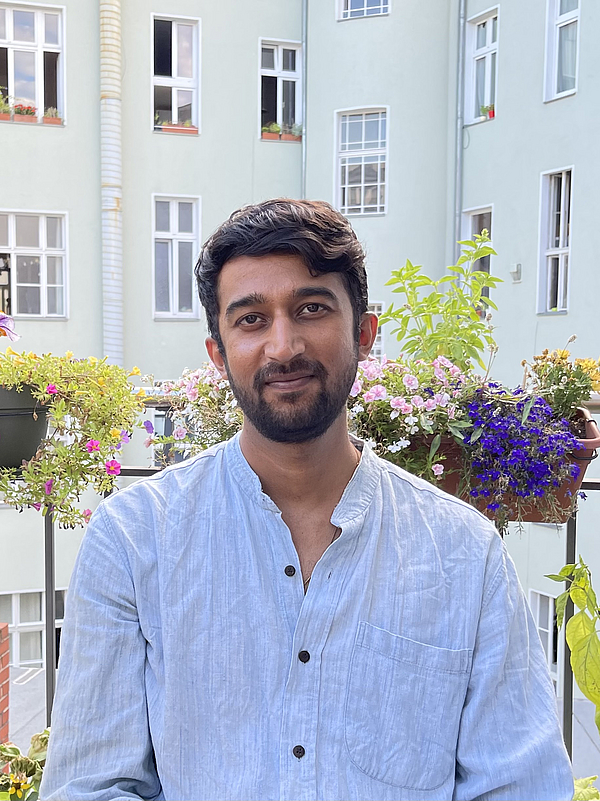Mihir Sharma
SFG 3100
mihirprotect me ?!uni-bremenprotect me ?!.de
Office hours: Thursdays, appointments via e-mail
Pronouns: he/him
Mihir is an anthropologist, writer, translator, and a creature interested in politics, jazz, and cuisine. At the University of Bremen, Mihir works as a researcher in critical diversity and anti-racism research at the Faculty of Cultural Studies.
Trained as an anthropologist in Connecticut, Missouri, the United Kingdom, and Germany, Mihir has pursued research, teaching, mentoring, and writing in the fields of political, medical, and economic anthropology. He seeks to combine critical pedagogy with a Forschendes Lernen approach in his teaching.
Mihir completed a B.A. in four-fields anthropology at Connecticut College, with concentrations in postcolonial studies, gender studies, linguistics (at the School of Oriental and African Studies, London) and critical pedagogy. Thereafter, he studied medical anthropology in Heidelberg, also taking courses in political theory and philosophy. Between 2014-16, Mihir co-founded the first high school social and cultural anthropology department in Germany at the United World College in Freiburg im Breisgau. He began his doctoral research at the Freie Universität Berlin, and completed it at the University of Bayreuth.
He is currently working on the publication of a monograph based on past research on the Black Lives Matter movement. As part of his doctoral dissertation, he conducted fieldwork with activists, journalists, lawyers, and residents of St. Louis in the aftermath of the Ferguson uprising. This manuscript examines the political stakes and subjectivities which become relevant after the cameras left the alleged birthplace of the Black Lives Matter movement following the longest street protest campaign in the Midwest. As part of this project, he contributed articles and essays on the topic for a range of publications including Jacobin Magazine and Analyse und Kritik. He also translated chapters of the Suhrkamp reader on abolitionism in German.
His research interests include social movements, activism, race/racism and anti-racism, work and labor, environmental and climate justice, and public health. He is also interested in transdisciplinary work on themes of (in)commensurability, ambivalence, and causality. He has previously taught seminars on political and medical anthropology, social theory, and ethnographic writing.
He is co-founder of the collective Antifascist Curries in Berlin. He curates events about social movements, political economy, and climate justice.
Mihir’s doctoral dissertation engaged ethnographically with the afterlives of the nominal Black Lives Matter movement, focusing on an abolitionist campaign in St. Louis, Missouri. Based on eighteen months of fieldwork, his monograph seeks to intervene in ongoing debates about political subjectivity, subjectivization, and relational analyses of anti-racist organizing.
Mihir’s current project is focused on mobilizations of temporalities and their effects in climate justice movements. Specifically, the project seeks to examine in comparative perspective how implicit methods of quantification, ideas of urgency, and sociocultural relations are entangled in scalar, spatial, and affective registers. How do various actors navigate goals such as preventing the 1.5 degree C rise in global temperature? How do these actors imagine, embody, and materialize kinship, subjectivity, and agency - with which effects? How can a critical anti-racist anthropology, following Leith Mullings, contribute to understanding the relational entanglements of insurgent desires, temporalities, and political goals?
In Bremen
WS 2024/25: M3: Transcultural Competence: Critiques and Praxis of Anti-discrimination
SS 2025: M8/9/10: (TBD)
Previously:
(In English)
* Empire, Colonialism, and Decolonization
* Anthropology of Social Movements
* Decolonial Theory
* Academic Writing and Presentation
* Resistance, Liberation, and Revolution (with Agnieszka Pasieka)
* Mobilizing Blackness: From the Haitian Revolution to Black Lives Matter
* Anthropology of Surveillance and Policing
* Belonging and Citizenship in the Postcolony
(In German)
* Schwarz-sein Moblisieren: Von der Haitianischen Revolution zu Black Lives Matter
* Anthropologie der Überwachung
* Anthropologie der Zeit
* Transkulturelle Kompetenz: Antirassismus und Kritische Diversitätsforschung
* Wirtschaftsanthropologie
* Vom Feudalismus zum Finanzkapitalismus: Ethnographien des Kapitalismus
* Einführung in die kritische Medizinanthropologie
* Covid-19 Verstehen: Eine Interkative Anthropologie der Pandemie (mit Uli Beisel)
* Vom Occupy Wall Street zu Rhodes Must Fall: Anthropologie der sozialen Bewegungen (mit Katharina Schramm)
* Städtische soziale Bewegungen (mit Jan Hutta)

